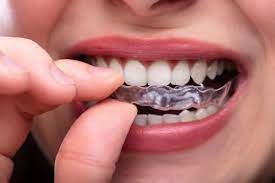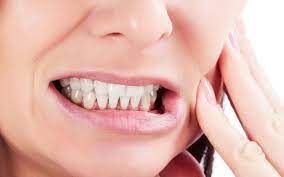Teeth Grinding Problems, Online Bruxism Question Chat
Do your molar or back teeth look kind of flat? Do you feel as though your jaw is tired when you wake up? You may be grinding your teeth or clenching your teeth very hard while sleeping. It is good to get a full dental exam at your local dental office and have your dentist check out your teeth. Some people start to grind their teeth when they are sleeping. This condition is called bruxism. This can possibly cause damage and extensive wear on the teeth, if not treated. The level of bruxism or severity of grinding at night, can vary.
Teeth Grinding Problems Chatting and Online Bruxism Chat:
If you are a person who has worn down teeth or wakes up in the morning with a headache, then maybe you have a teeth-grinding or bruxism problem. We get asked many Local Bruxism Questions Online or Ask a Grinding Your Teeth Question Online at DentalChat.
Discussing online Teeth Grinding and Bruxism Treatment Discussion:
Bruxism or grinding your teeth which usually happens at night while sleeping is not only common for adults - but it happens for children and young adults as well. By some estimates, approximately 8% of people in the USA have some sort of bruxism.
Teeth grinding is dentally or clinically referred to as bruxism. Bruxism is the act of clenching and grinding the teeth (consciously or unconsciously) either during the day or while you sleep. Bruxism is considered both a medical and a dental problem. It affects not only the teeth but also the surrounding supporting dental structures in the mouth.
Common dental bruxism question - how do I know if have bruxism or am grinding my teeth?
Are your teeth fairly short or worn down? People who have dental bruxism or who grind their teeth at night, usually have flatter teeth. Let's discuss this more in this local dental bruxism blog. Most people have cusps on their molar teeth. If the cusps have been worn down - then there is a possibility that you are grinding your teeth while sleeping.
Are there any cures for bruxism or grinding teeth? No cures, but there are dental treatments such as wearing a nightguard at night and doing relaxation regimens that can help better control bruxism from damaging your teeth.
Teeth Grinding Question, Bruxism Questions - Using Teledentistry Bruxism Consulting:
We get asked many local teeth-grinding questions online & online bruxism questions at DentalChat. You can either do a Dental Teeth Grinding Chat or use Teledental Bruxism Consult Online with us. Grinding typically occurs during sleep. If you've ever had a roommate or loved one who grinds their teeth, you know how terrible grinding teeth can sound. It can be mild or extreme. The extreme side of teeth grinding can be so bad, that can actually hear someone clenching and grinding their teeth. It can be just as bothersome as someone snoring in the same room. If the grinding is bad enough, it can wake others in the chamber.
Bruxism is not considered a serious disorder although it can potentially cause permanent damage to your teeth and cause headaches, jaw pain, and ear pain.
Various Treatment Methods For People That Do Teeth Grinding - Wearing A Nightguard At Night:
There are various treatments and remedies for treating people who are teeth grinding or have bruxism tendencies. The treatments usually focus on reducing pain, modifying clenching behaviors, and preventing permanent damage to the teeth.
First and foremost, before doing any home remedies - good to see a dentist and see if they can fabricate a nightguard or another form of dental appliance, to help protect the teeth.
There are some dental remedies your local dentist or dental office can offer. The key is, to first get a thorough dental exam at your local dentist's office. They can notice fairly quickly if you are grinding your teeth while sleeping or not.
What is a nightguard? Think of a nightguard, as a form of mouthguard - that is worn at night or while sleeping. The best place to get a nightguard is at your dental office.
Nightguard Dental Question - Dental Night Guard Questions:
There are many people wearing dental nightguards at night while sleeping. One dental question we get asked, is can I get my dental night guard anywhere or should I go to my local dentist? Visiting your local dental office and getting a dental exam & dental treatment plan is preferred. A big dental advantage is that by being under the dental care of a dentist - you can get customized dental service. There is more than one type of dental nightguard appliance in the dental marketplace. Your dentist can provide better suggestions and provide a more customized approach to your bruxism treatment. A dental night guard can help people with bruxism, to reduce the amount of wear on the teeth. By having a night guard appliance, the teeth can not grind onto one another. Instead, the plastic or clear night guard layer provides separation between the upper and the lower teeth. Night guards can look similar to mouth guards that people playing sports use.
Dental Bruxism Treatment Question and Grinding Teeth Treatment Questions:
One thing that is interesting - is that there are differing degrees of bruxism. Some people have severe bruxism, in which - will notice that their teeth have been ground down quite a bit. Other people may have occasional dental bruxism issues. Your local dentist can provide various types of dental appliances - based on the level of bruxism. Another thing to keep in mind - is the type of dental treatment you may be getting. People with severe bruxism, for instance, may end up breaking or chipping dental veneers - as compared to someone who does not have any bruxism condition.
Some of the things that some people do at home to help relieve pain from bruxism may include:
- Relaxing your facial and jaw muscles and making it a habit of doing this throughout the day.
- Applying wet heat or ice to sore jaw muscles.
- Drinking plenty of water.
- Massaging the muscles of the face, neck, and shoulders.
- And working on reducing your daily stress levels through relaxation.
Health professionals also often recommend that you manage stress levels and try various ways of reducing your stress, by exercise or other forms of activities that may reduce your stress level. We are at DentalChat discussing various online dental topics and dental treatments. We welcome our user's feedback on dental bruxism and other topics. We welcome your local dental suggestions on what dental topics like to read here. Our goal is to be the premier dental information blog. We do network with local dentists and dental companies.
Summary - Grinding Your Teeth Information and Dental Bruxism Treatment Question Answers
As we discussed, many people have various types of bruxism or grinding teeth problems. Bruxism can damage your teeth and there are ways to help treat it with dental oral appliances such as nightguards. We are at Dentalchat.com discussing many types of dental problems people may be facing. Ask us a dental bruxism question or any other type of dental question online. We are here to provide online dental information. Excellent opportunity for local dentists and dental practices to work with us.


